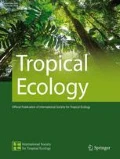Abstract
The changes in natural ecosystems provide opportunity to increase vegetation carbon sink capacity and thereby contribute to mitigation of climate change impacts. The Indian tropics and the large ecological variation within the country afford the advantage of diverse niches and offer opportunities to reveal the role of biotic factors at different levels of organization from populations to ecosystems. The last 4 decades of research and development in the Indian space science community has been primarily application driven in response to the government space programme for national development. The expenditure in R&D over next 5 year suggest that scientific research is higher on the country's agenda. The Indo-UK Terrestrial Carbon Group (IUTCG) comprising both Indian and UK scientists, funded jointly by the Department of Science and Technology, India and the Department of Business, Innovation and Skills organised a workshop to explore ways in which Earth observation data can be effectively utilised in mitigating the impacts of climate change through vegetation management. Effective integration of field observations, collected through various monitoring networks, and satellite sensor data has been proposed to provide country-wide monitoring.

Similar content being viewed by others
References
Anon. (2019) Research and development expenditure ecosystem: the way forward. https://psa.gov.in/sites/default/files/pdf/RD-book-for-WEB.pdf. Assessed 11 Sept 2019
Behera MD, Dash J (2013) Terrestrial carbon studies and earth observation data. Curr Sci 104:413
Behera MD, Tripathi P, Das P, Srivastava SK, Roy PS, Joshi C, Behera PR, Deka J, Kumar P, Khan ML, Tripathi OP, Dash T, Krishnamurthy YVN (2018) Remote sensing based deforestation analysis in Mahanadi and Brahmaputra River Basin in India since 1985. J Environ Manag 206:1192–1203
Chazdon RL (2008) Beyond deforestation: restoring forests and ecosystem services on degraded lands. Science 320:1458–1460
Jha S (2012) The Green India Mission (GIM): a roadmap for neoliberal exploitation in forest. Ind J Polit Sci 73:385–398
Khuroo AA, Weber E, Malik AH, Reshi ZA, Dar GH (2011) Altitudinal distribution patterns of the native and alien woody flora in Kashmir Himalaya, India. Environ Res 111:967–977
Lal R (2002) Soil carbon sequestration in China through agricultural intensification, and restoration of degraded and desertified ecosystems. Land Degrad Dev 13:469–478
Menon S, Hansen J, Nazarenko L, Luo Y (2002) Climate effects of black carbon aerosols in China and India. Science 297:2250–2253
Menzel A, Fabian P (1999) Growing season extended in Europe. Nature 397:659–659
Sharma S, Roy PS (2007) Forest fragmentation in the Himalaya: a Central Himalayan case study. Int J Sustain Dev World Ecol 14:201–210
Acknowledgements
The manuscript has derived inspiration from a workshop organised at IIT Kharagpur, funded jointly by the Department of Science and Technology (DST), India and the Department of Business, Innovation and Skills (BIS) with Indo-UK Terrestrial Carbon Group (IUTCG) comprising both Indian and UK scientists.
Author information
Authors and Affiliations
Corresponding author
Rights and permissions
About this article
Cite this article
Dash, J., Behera, M.D., Jeganathan, C. et al. India’s contribution to mitigating the impacts of climate change through vegetation management. Trop Ecol 61, 168–171 (2020). https://doi.org/10.1007/s42965-020-00075-9
Received:
Revised:
Accepted:
Published:
Issue Date:
DOI: https://doi.org/10.1007/s42965-020-00075-9




